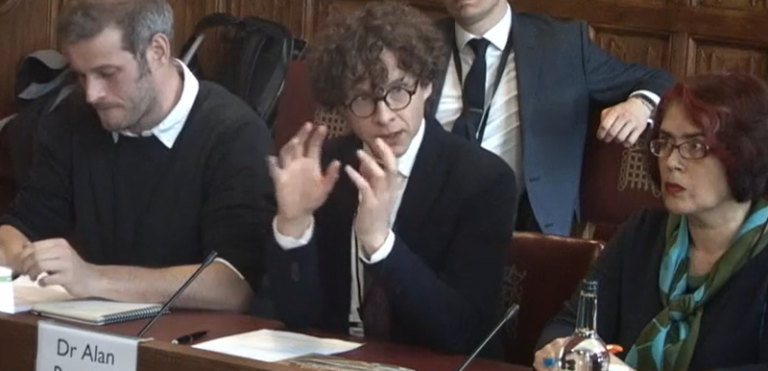Dr Alan Renwick gives evidence to House of Lords Democracy and Digital Technologies Committee
13 March 2020
Dr Alan Renwick, Unit Deputy Director, gave expert evidence to the House of Lords Democracy and Digital Technologies Committee on how digital technologies can bolster democracy.

On 10th March, the Unit’s Deputy Director, Dr Alan Renwick, gave expert evidence to the House of Lords Democracy and Digital Technologies Committee. The committee is examining both the challenges and the opportunities for democratic practice created by the rise of digital technologies, and this session focused on potential positives. Dr Renwick appeared alongside Unit Fellow Professor Cristina Leston-Bandeira from the University of Leeds, Joe Mitchell from Democracy Club, and Peter Baeck from NESTA.
Dr Renwick’s remarks drew on last year’s Unit report, which he co-authored with Michela Palese, on Doing Democracy Better: How Can Information and Discourse in Election and Referendum Campaigns in the UK Be Improved? He particularly highlighted the recommendation to establish a ‘democracy hub’: a central resource bringing together information from diverse sources to empower voters to make informed choices. This would range from basic information, such as how and where to vote, through to information on candidates and party policies, and could extend to information generated by citizens’ assemblies and other deliberative processes.
Dr Renwick also identified four key elements of participation in democracy and how they can be enhanced by digital technologies:
- Inclusivity – how to encourage greater participation. For example, petitions provide people with more opportunities to participate beyond elections.
- Equality – how to ensure everybody can participate in democracy equally, so that those who do participate are representative of wider society. Online voter registration is one mechanism for engaging groups that might otherwise be less inclined to participate
- Information – how to provide people with accessible and reliable information. Dr Renwick highlighted the work of Democracy Club which provides basic election information and suggested this was a model that could be built on.
- Thoughtfulness – Dr Renwick discussed the importance of providing space for people to discuss matters openly with others. This needs to be designed carefully to ensure participation is also equal and informed.
Committee members asked whether digital deliberative mechanisms risk side-lining representative democracy. Dr Renwick and other panel members argued that such mechanisms should be designed so as to strengthen and enable, rather than replace, representative democracy.
The session was immediately followed by a further evidence session focusing on citizens’ assemblies. The witnesses included Tim Hughes from Involve and Professor Graham Smith from the University of Westminster – both of whom worked with the Unit on the Citizens’ Assembly on Brexit – as well as Rebecca Rumbul from My Society.
Evidence in full:
Watch both evidence sessions here.
 Close
Close

